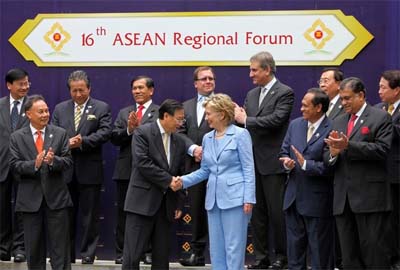North Korea has time and again said it will ‘never’ return to the 6PT, despite the urging of the other five parties, including China and Russia. (Russia in fact has joined with South Korea in proposing five-party talks instead.) Perhaps Kim Jong Il will change his mind. But the option of direct U.S.-North Korea talks evidently is still up for consideration. Secretary Clinton is not helping matters by her dismissive attitude. Just before the meeting of the ARF, she likened the North Koreans to ‘small children and teenagers and people who are demanding attention.’ Her advice: ‘Don’t give it to them.’ Maybe that’s sound advice for parents; but it clearly doesn’t work in international affairs. The North Koreans, predictably, had undiplomatic words of their own, calling her ‘a funny lady . . . [who is] unaware of the elementary etiquette in the international community. Sometimes she looks like a primary schoolgirl and sometimes a pensioner going shopping,’ said a foreign ministry statement.
Such exchanges are unhelpful at best and provocative at worst. To classify the North Koreans as unruly children is arrogant and gratuitous: Their motives are rational, and their behavior, though surely frustrating and disagreeable to most Westerners, has understandable roots and a political objective. The ARF meeting would have been a good time for informal exchanges of view between the U.S. and North Korean sides that might have led to a clearer understanding of Pyongyang’s behavior, as well as of ways to find common ground. All the more so since North Korea is a member of very few other regional organizations. ARF thus provides a rare point of contact with the North on security matters. It was an opportunity that should have been grasped.
Two past events may illuminate this last point. In 1954, on the eve of an international conference in Geneva to settle the war in Vietnam, then U.S. Secretary of State John Foster Dulles was asked if he would be meeting with China’s premier, Zhou Enlai. ‘Only if our cars collide,’ Dulles said. It was one of many lost opportunities to engage China in the early days of the Cold War. Years later, in 1969, a future U.S. president wrote on China policy in Foreign Affairs that dealing with ‘Red China’ was like dealing with ‘the worst elements in our ghettos.’ Dulles never did acknowledge Zhou’s presence, much less talk with him. Richard Nixon, of course, wound up making a breakthrough trip to China in 1972.
The U.S. State Department might learn something from those experiences. There is no harm in talking with one’s adversary, and no gain from not talking. President Obama promised a new realism in foreign affairs that would accept dialogue with any leader. He thus seemed, wisely, to reject the Bush-Cheney approach, which engaged in name-calling (Bush once characterized Kim Jong Il as a ‘pygmy’) and bombast (‘We don’t negotiate with evil,’ said Cheney). It’s time to live up to the promise of restoring diplomacy to its proper place in the conduct of U.S. foreign relations.
—
Mel Gurtov is Professor Emeritus of Political Science in the Hatfield School of Government at Portland State University; Visiting Professor of Political Science at the University of Oregon (2008-10); and Editor-in-Chief of Asian Perspective. His most recent book is Global Politics in the Human Interest, 5th revised ed. (Lynne Rienner, 2007).


While the two examples Gurtov used were interesting, it involved Zhou Enlai and China, to whom and which the North and its leadership are so different. Zhou was so skilful diplomatically and the red China was much more rational and reasonable than the North. And the red China was relatively more powerful than the North. This situation with the North now cannot be any more different from those two examples, no matter from what point of view. The North has played itself into a corner now and only it can get itself out it, by coming back to the six party talks and stop to denuclearise.
Gurtov argues for dialogue with the North by the US. There is a danger in doing that. It may fall into another trap of causing divisions among the six party members other than the North and might be used by it to achieve “divide and conquer”. It appears to be a very poor strategy.
The solidarity and coordination of the 5 members is important, especially after so many “stop and go” in the six party meetings with the North.